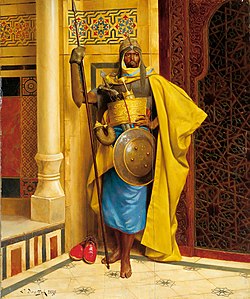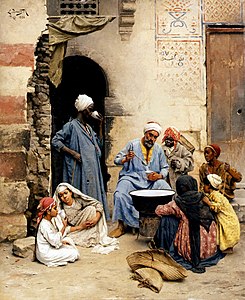Ludwig Deutsch
| Ludwig Deutsch | |
|---|---|
 Ludwig Deutsch'un "Scribe" tablosu, 1911 | |
| Genel bilgiler | |
| Doğum | 13 Mayıs 1855 |
| Ölüm | 9 Nisan 1935 Paris, Fransa |
| Uyruk | Avusturyalı |
| Alanı | Ressam |
Ludwig Deutsch (13 Mayıs 1855 - 9 Nisan 1935), Paris'e yerleşen ve ünlü bir oryantalist sanatçı haline gelen Avusturya kökenli bir Fransız ressamdı.[1][2][3][4] 1872'den 1875'e kadar Viyana Güzel Sanatlar Akademisi'nde okuduktan sonra, 1878'de Paris'e taşındı ve burada diğer Oryantalist ressamlarla ilişki kurdu. Eserlerinin çoğunu Paris'teki atölyesinde boyadı, ancak 1885'ten 1898'e kadar Mısır'ı birkaç seyahatte ziyaret etti. 1919'da Fransız vatandaşı oldu.
Hayatı ve kariyeri
[değiştir | kaynağı değiştir]Ludwig Deutsch'un hayatının ayrıntıları belirsizdir. 1855'te Viyana'da bir Yahudi ailesinde doğdu. Babası Ignaz Deutsch, Avusturya mahkemesinde finansördü.[5]
İlk sanat eğitimini Anselm Feuerbach'ın (1875-1877) vesayeti altında Akademie der Bildenden Künste'de (Viyana Güzel Sanatlar Akademisi) aldı.
Paris'te, ömür boyu arkadaşı olan sanatçılar Arthur von Ferraris, Jean Discart ve Rudolf Ernst ile tanıştı.[6][7] Bu dostluklar sayesinde Deutsch, Oryantalist sanata ilgi duymaya başladı.
1880 civarında Viyana ile olan bağlarını kopardı ve kalıcı olarak Paris'e yerleşti. Paris'te Rue Le Pelletier'de bir stüdyo kurdu ve büyük bir başarı ile resimlerini sergilemeye başladı.[8]
Seçilmiş tabloları
-
The Nubian Palace Guard
-
The Inspection, 1883
-
The Sahleb Vendorm, 1886
-
The chess game between Tha'ālibī and Bakhazari, 1896
-
In the Madrasa, y.1900
-
The Smoker, 1903
-
The Furniture Maker, 1900
Bazı resimleri
- The Domino Players, 1882
- An Orientalist Amateur, 1883
- The Musician, 1883
- The Sentinel, 1885
- News from Sudan, 1885
- The Answer, 1886
- The Sherbert Vendor, 1886
- The Hour of Prayer, 1887
- The Snake Charmers, 1888
- Court of El Azhar University, Cairo, 1890
- The Healer, 1891
- The Orange Seller, 1892
- The Palace Guard, 1892
- The Emir's Guard, 1893
- The Scribe, 1894
- The Scholar, 1895
- The Chess Game 1896
- The Philosopher, 1897
- The Offering, 1897
- Prayer at the Tomb, 1898
- Leaving the Mosque, 1900
- The Learned, 1900
- Interior of Mosque, 1902
- The Harem Watchman 1903
- The Koran School, 1905
- Morning Prayer, 1906
- The Narghil Smoker, 1907
- Le Maitre, 1907
- The Procession of the Mahmal through the Streets of Cairo, 1909
- At Prayer, 1911
- The Scribe, 1911
- The Treasure Chest, 1920
- At Prayer, 1923
- The Fortune Teller, 1927
- Musical Interlude, 1932
Ayrıca bakınız
[değiştir | kaynağı değiştir]Kaynakça
[değiştir | kaynağı değiştir]- ^ "ULAN Full Record Display (Getty Research)". www.getty.edu. 18 Ağustos 2020 tarihinde kaynağından arşivlendi. Erişim tarihi: 23 Mayıs 2022.
- ^ "Discover painter Ludwig Deutsch". rkd.nl (İngilizce). 15 Şubat 2021 tarihinde kaynağından arşivlendi. Erişim tarihi: 23 Mayıs 2022.
- ^ "Deutsch, Ludwig, 1855-1935 - Social Networks and Archival Context". snaccooperative.org. 23 Mart 2022 tarihinde kaynağından arşivlendi. Erişim tarihi: 23 Mayıs 2022.
- ^ Congress, The Library of. "Deutsch, Ludwig, 1855-1935 - LC Linked Data Service: Authorities and Vocabularies | Library of Congress, from LC Linked Data Service: Authorities and Vocabularies (Library of Congress)". id.loc.gov. 23 Mart 2022 tarihinde kaynağından arşivlendi. Erişim tarihi: 23 Mayıs 2022.
- ^ Guenther Wimmer, Martina Haja: Les Orientalistes des Ecoles allemande et autrichienne. Courbevoie 2000. ISBN 978-2-86770-140-5
- ^ Orientalism: Delacroix to Klee Roger Benjamin, Mounira Khemir, Ursula Prunster – 1997 "Rudolph Ernst, like his friend Ludwig Deutsch, was a Viennese-born Orientalist who settled in Paris during the 1870s."
- ^ Hali, The international magazine of antique carpet and textile art: Volume 8 1986 "Ludwig Deutsch is perhaps the Austrian Orientalist most sought after by collectors. One of his works on show, 'The Scholar', is a fine example of the artist at his very best. Dated 1901 and painted in Paris, like the vast majority of his works, it has ..."
- ^ Roger Benjamin, Mounira Khemir, Ursula Prunster (1997) Orientalism: Delacroix to Klee. "Rudolph Ernst, like his friend Ludwig Deutsch, was a Viennese-born Orientalist who settled in Paris during the 1870s."







